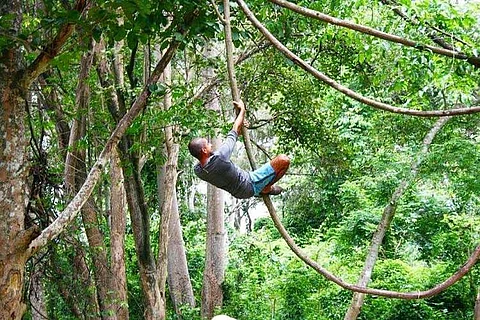

It is somehow strange, watching Vijo Varghese sit on a beanbag in a city café. Even more strange is watching him order a chicken sandwich. He is tired of saying this - he is not a vegan, not a vegetarian. Just because he looks after 15 acres of a nature reserve in Thailand, it doesn’t mean he has turned into a saint. There have been changes, yes. There is very little he wants from life now, his needs are few.
Somehow that statement makes you judge, make note of appearances. Seems true enough. He looks and acts simple, talks easily. Hard to believe that this is the man who was once an automotive journalist travelling around the world with his love for cars. That’s the dream job for any boy, isn’t it, he asks, in between sandwich bites.
But five years later, the dream job had tired him. He is now happily a nature man, if you can call him that, living and working in the middle of a forest, 200 km away from Bangkok, in a place called Kanchanaburi. “We called it our land, my friend Anshu and I, after taking it on lease with the thought of coming closer to nature,” Vijo says, sitting in a café in Thiruvananthapuram. He is a Malayali, one parent from Tripunithura and the other from Idukki, but got shipped off to Thailand as a baby and grew up there. He has come for a short stay in the capital now, where his sister lives, before going back to Our Land, with a capital O and a capital L. They named it the way they had spoken endearingly of it, their land.
“The basic idea,” Vijo says, “is to create more living space for wildlife.” He sketches a rough picture on a notebook to show how this works. Thailand’s Wildlife Sanctuary of 1965 is at the top of the map. Our Land lies somewhere below. Animals from the sanctuary, elephants especially, troop over to Our Land, so do bears, wild pigs and banteng (wild cattle). On either side of Our Land are farms. Guests visiting Vijo’s place can tour the woods, the farms and learn about wildlife.
“We have snakes too, for educational tours,” he says. Students come visiting from near and far to learn about wildlife, learn about snakes - ‘how not to get bitten’, ‘what to do if you are bitten’.
Vijo is not sure when his love for nature began. It could be somewhere in his childhood, when he lived on the outskirts of Bangkok and played with snakes! Yes, played with snakes, he says casually. (His eyes gleam when he talks about Vava Suresh, the famous snake catcher and snake lover of Kerala.)
But then like a good son, he did his computer engineering like his dad wanted. But before he finished his Masters in marketing, something told Vijo this wouldn’t work. That’s when he got his dream job. But then Vijo found himself suffering from a back problem and visiting hospitals for a whole year. He was tied to his bed for long before he did a risky surgery and got better again.
Vijo then had another brief stint in journalism in Kerala before Thailand lured him back with a job at Chevrolet. This time, he turned a PR and took other journalists with him for car stories in different countries. It is on a trip like that to South Africa and seeing a nature reserve park there that put the idea of starting one, into his head. And then there was a Nepal trip with friends, Anshu among them. “Coming back, I looked for a piece of land and I called up Anshu. He said, yeah ok. Just like that.”
There was a third partner, a Thai man, who left when there was a difference of opinion on how to bring energy to the land. Vijo opted solar, the other man wanted generators. Solar won.
“It’s all about sustainability,” Vijo says. He repeats that word now and then.
Vijo (right) with his guests float down the river to reach Our Land
When Our Land came up, Vijo told his guests the way to reach there was by floating through a river for 40 minutes. People floated with their life-jackets, learning about the birds and animals they saw on the way. “There is another way they could drive in but we wouldn’t prefer it,” Vijo says.
Something to do with being green, you guess. For, Vijo uses rain water for the kitchen and baths and toilets. He and his staff built their own shelters. They tried growing food too, but every time they did, elephants would come and have them all.
Vijo says that with a certain affection. Elephants are clearly one of his favourite beings. “In the last four decades, 52 per cent of wildlife has been wiped off the planet. There’s been no effort to realise this,” he says sadly. This is then his little effort to let the wild live on.